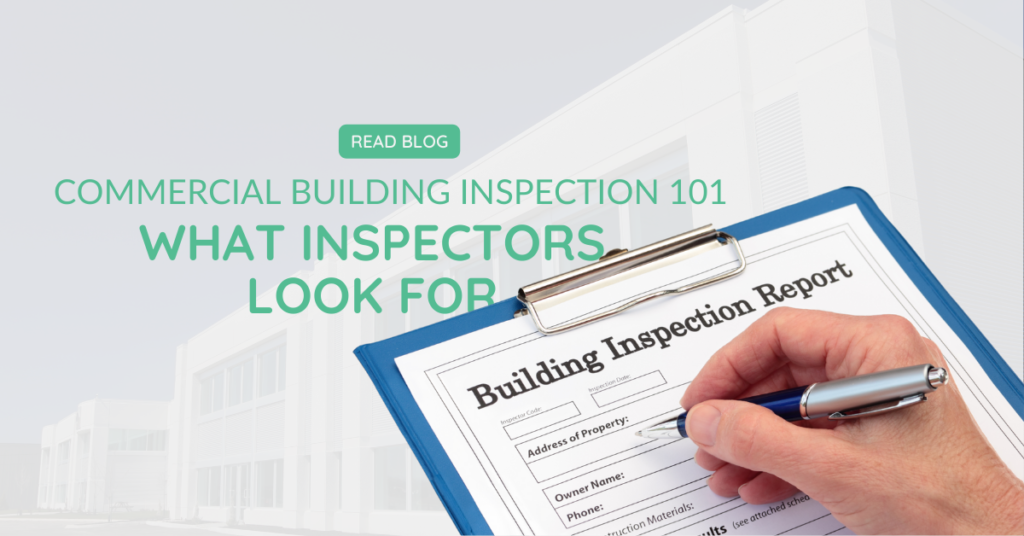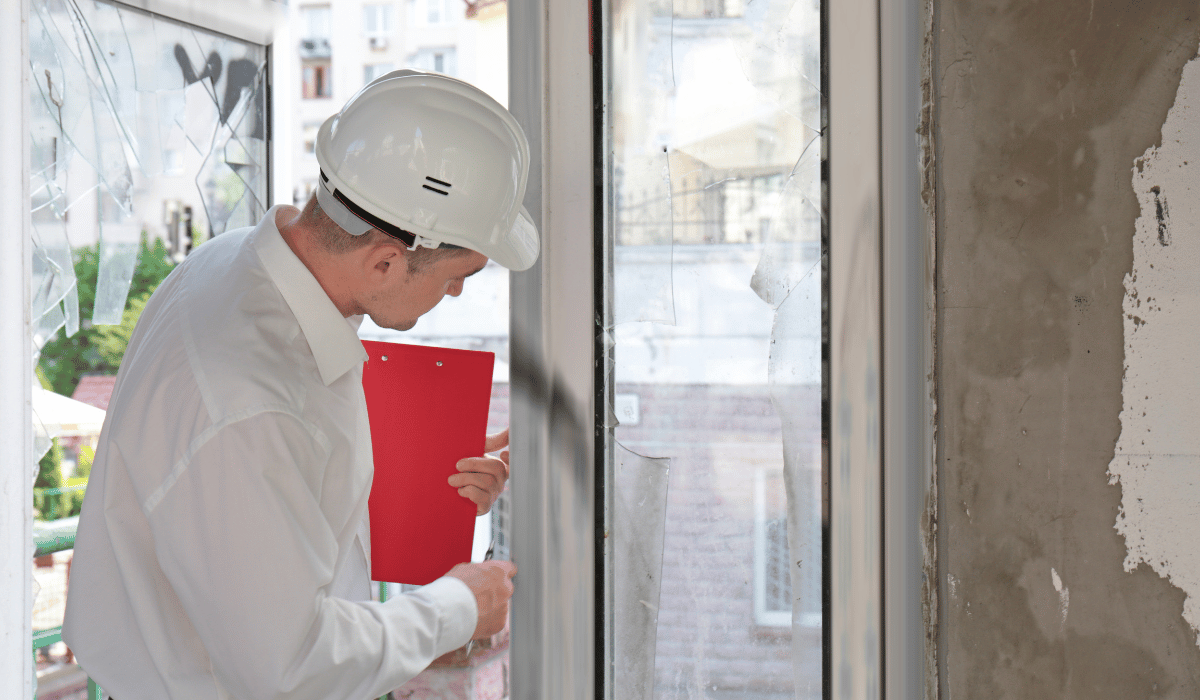Commercial Building Inspection 101: What Inspectors Look For
Reading Time: 4 minutesEnsuring the safety, compliance, and overall condition of a commercial building is crucial for property owners, managers, and tenants. Regular inspections help identify potential issues before they become costly problems. In this guide, we’ll cover what inspectors look for during a commercial building inspection, helping you understand the process and prepare your property effectively. …

Ensuring the safety, compliance, and overall condition of a commercial building is crucial for property owners, managers, and tenants. Regular inspections help identify potential issues before they become costly problems.
In this guide, we’ll cover what inspectors look for during a commercial building inspection, helping you understand the process and prepare your property effectively.
Table of Contents
The Purpose of Commercial Building Inspections

Commercial building inspections are essential for maintaining the safety, functionality, and value of a property. These inspections help identify structural issues, system inefficiencies, and compliance problems that could affect the building’s performance and safety.
Inspectors examine various aspects of a commercial building, including its structure, systems, safety features, exterior, and interior components. In the following sections, we’ll delve into each of these areas to understand what inspectors specifically look for.
1. Structural Integrity
Is your building standing strong? This section dives into the foundation, roof, walls, and framing, highlighting what inspectors look for to ensure the structural integrity of your commercial property.
Foundation
The foundation is critical to the stability of a building. Inspectors check for signs of cracking, shifting, or settling, which could indicate serious structural problems. They may also look for water intrusion or drainage issues that could undermine the foundation.
Roofing
Roof inspections focus on the condition of the roofing materials, the presence of leaks, and the effectiveness of drainage systems. Inspectors check for signs of wear, damage, and proper installation to prevent water damage and maintain the building’s integrity.
Walls and Framing
Inspectors examine the walls and framing for damage, warping, or moisture intrusion. They look for cracks, signs of movement, and any structural weaknesses that could compromise the building’s stability.
2. Building Systems
From keeping the lights on to ensuring clean air and proper water flow, building systems are vital. Here, we explore how inspectors assess electrical, plumbing, and HVAC systems for optimal function and safety.
Electrical Systems
Safety and compliance with electrical codes are paramount. Inspectors assess the overall condition of the electrical system, including wiring, panels, and outlets. They check for any signs of overload, wear, or improper installations that could pose a fire hazard.
Plumbing Systems
Inspectors evaluate the condition of the plumbing system, looking for leaks, pipe corrosion, and water pressure issues. They also check drainage systems to ensure there are no blockages or potential problems that could lead to water damage.
HVAC Systems
Heating, ventilation, and air conditioning (HVAC) systems are inspected for operational efficiency and proper maintenance. Inspectors check filters, ducts, and units to ensure they are clean and functioning correctly, contributing to good indoor air quality.
3. Safety and Compliance
From keeping the lights on to ensuring clean air and proper water flow, building systems are vital. Here, we explore how inspectors assess electrical, plumbing, and HVAC systems for optimal function and safety.
Fire Safety
Fire safety is a critical aspect of any commercial building inspection. Inspectors verify the presence and condition of fire sprinklers, alarms, extinguishers, and emergency exits. They ensure that these systems comply with local fire codes and regulations.
Accessibility
Compliance with the Americans with Disabilities Act (ADA) is mandatory for commercial buildings. Inspectors check for accessible entrances, restrooms, and pathways to ensure the building is accessible to individuals with disabilities.
Environmental Hazards
Inspectors look for environmental hazards such as asbestos, mold, or other hazardous materials. Identifying and addressing these issues is essential for the health and safety of the building’s occupants.
4. Exterior and Grounds
Safety and functionality extend beyond the walls. This section explores how inspectors assess parking lots, sidewalks, landscaping, and drainage systems to ensure a well-maintained and accessible exterior environment.
Parking Lots and Sidewalks
The condition of parking lots and sidewalks is important for safety and accessibility. Inspectors check for cracks, potholes, proper markings, and any trip hazards that need to be addressed.
Landscaping
Properly maintained landscaping can prevent damage to the building. Inspectors look for overgrown vegetation, tree roots that could impact the foundation, and other landscaping issues that need attention.
Drainage Systems
Effective drainage is crucial for preventing water damage. Inspectors examine grading, gutters, and downspouts to ensure water is properly diverted away from the building.
5. Interior Components

What’s on the inside matters. Here, we explore how inspectors evaluate floors, ceilings, doors, windows, and insulation to ensure the building’s interior components are in good condition and functioning properly.
Floors and Ceilings
Inspectors assess the condition of floors and ceilings, looking for signs of wear, damage, or structural issues. This includes checking for water damage, cracks, and proper installation.
Doors and Windows
The operational efficiency, sealing, and security of doors and windows are important. Inspectors ensure they open and close properly, provide adequate insulation, and are free from damage.
Insulation
Proper insulation is essential for energy efficiency and comfort. Inspectors check the adequacy and condition of insulation materials in walls, ceilings, and other areas.
6. Documentation and Records
Keeping track of important documents is also vital. This section explores the importance of maintenance records, building plans, and permits & certificates for a comprehensive understanding of your commercial property’s history and compliance.
Maintenance Records
Inspectors review past maintenance and repair records to understand the building’s history and identify any recurring issues that need to be addressed.
Building Plans
Comparing current conditions with original building plans helps inspectors identify any unauthorized modifications or deviations from the approved design.
Permits and Certificates
Inspectors verify that all necessary permits and certificates are in place, ensuring that the building complies with local regulations and codes.
Conclusion
Commercial building inspections cover a wide range of aspects, from structural integrity and building systems to safety and compliance. Regular inspections help maintain the safety, functionality, and value of your property.
Navigating the complexities of commercial building inspections can be challenging. At Green Ocean Property Management, we offer comprehensive inspection services to ensure your property meets all safety and regulatory standards.
Protect your investment with expert insights! Contact Green Ocean Property Management today, where you not only get property management but also peace of mind.
Avoiding Tenant Complaints: Your Guide to Happy Renters
Reading Time: 5 minutesRunning a rental property shouldn’t give you headaches. Yet many landlords find themselves dealing with endless tenant complaints and midnight emergency calls. Fortunately, most common problems can be prevented with the right approach. Why Tenants Complain (And Why You Should Care) Tenants complain for various reasons, and as a property owner, it’s…
What makes a Property Manager VALUABLE?
Reading Time: 3 minutes Hiring a property manager proves to be valuable to any landlord as it allows you to take care of your properties and tenants, especially if you have several properties. Property managers deal with the tenants and their concerns so landlords don’t have to.s been in the industry for over four decades. One of the…
How to Keep Things Organized when Owning a Multifamily Property
Reading Time: 2 minutes Multifamily properties, unlike single-family properties, need to be organized at all times because of the volume of tenants that this type of property has. Here are some efforts that Green Ocean Property Management does to make multifamily properties be organized. How does Green Ocean organize multifamily properties? We provide space for bicycle…








